What is Noise Pollution and is it Dangerous? | Connect Hearing

What is Noise Pollution and is it Dangerous? | Connect Hearing
10 min.
Publication Date: May 1, 2021
You may have heard about noise pollution on the news or read about it in your local paper or news site, but what exactly is noise pollution and is it bad for you?
The straightforward answer is ‘Yes’ — and it’s actually worse for you than you might think! When you’re constantly bombarded with loud, sustained noise, you can suffer from hearing damage which is irreversible. People living in cities or farms with loud machinery have become so used to the cacophony that they have learned to ignore it (when possible).
Globally, it’s an invisible threat that is projected to become one of the worst environmental problems worldwide over the next twenty years. As more people move to urban areas and Megacities continue to grow is size, noise pollution will only become a bigger problem.
What is Noise Pollution?
A good noise pollution definition is any atmospheric sounds that reach above 65 decibels (dB) as defined by the World Health Organization (WHO). As a comparison, any noise above 75 dB is considered harmful to your hearing and above 120 dB is extremely painful. In fact, sleep is difficult with any noise above 30 dB.
Because noise pollution is so prevalent today, the WHO estimates that 360 million people worldwide have some form of hearing loss.
Causes of Noise Pollution Affecting Everyone
It’s important to understand where all of this noise if coming from if we are going to do anything about it. While there is some noise pollution in rural areas, cities are far and away the major culprits with a constant onslaught to the senses — typically the larger the city, the louder the sounds.
Examples of Everyday Noise Pollution
- Traffic — downtown areas, highways, train stations, parking lots. A car horn typically has 90 dB, motorcycles at about 95 dB, and a city bus has around 100 dB.
- Air traffic as on average 130 dB.
- Construction sites where they use heavy equipment and smaller hand-held devices like jackhammers or drills can clock in at 110 dB.
- Concerts and festivals average around 100 dB.
- Restaurants, bars, pubs, and clubs are often in the 100 dB range (and louder when there’s a sporting event on screen).
- Even barking dogs can register around 60-80 dB (although, we’d never suggest giving up your furry friends).
Physical and Psychological Effects of Noise Pollution
More and more are being learned about the damaging effects of noise pollution. While it would seem obvious to be damaging to your ears, it’s now being reported to be damaging to your heart and blood vessels as well.
In a recent scientific article in the European Heart Journal, there is substantial evidence that loud noise that occurs while someone is sleeping can trigger the ‘flight or fight’ response. Without the person even being aware, this response causes the body to release cortisol and adrenaline, which can contribute to cardiovascular problems over time like high blood pressure, plaque build-up, obesity, and diabetes.
Whether awake or asleep, here are some of the physical and psychological effects of exposure to noise pollution:
Physical
Noise-induced hearing loss (NIHL) causing narrowing range of frequencies or impaired perception of sound; can also include sensitivity to sound and tinnitus of ringing in the ears
Rise in blood pressure, agitation, and a racing pulse
Headaches
Gastritis
Sleep disruption leading to irritability and aggressive behaviour
Cardiovascular issues, including heart attacks
Diabetes
Psychological
Stress and anxiety
Fatigue and slowed response time
Depression
Memory and concentration
Hysteria in both humans and animals
Solutions to the Noise Pollution Dilemma
With so much at stake, what can we do about the constant assault of noise in today’s world? As with so many things, there are both personal opportunities and community or governmental choices. Let’s look at both in turn:
Personal Options
Try ear plugs — Today, there are many different types of ear plugs available over the counter. They are often customizable or designed for a specific purpose, like outdoor work (e.g., mowing the lawn), concerts and festivals, motor sports, hunting and shooting, and sleeping. Many of today’s ear plugs feature advanced technology that allows you to hear what you need to hear while blocking out unnecessary noise making them safe for driving or operating machinery.
Consider white noise to gently ‘trick’ your ears and brain into ignoring other unpleasant noises. White noise from the low gentle humming sound of a white noise machine can help you fall asleep and can reduce stress, headaches, and even tinnitus.
Avoid noisy leisure activities and spaces like concerts, sporting events, or racing events.
Try alternative transportation such as electric vehicles and bikes and travel routes that are more conducive to quiet. With bikes, take advantage of parks or green spaces.
When building a new home or renovating an existing home, insulate with noise-absorbing construction materials to reduce sound and create a quiet environment to relax and enjoy.
Communities or Governments:
Create plans for noise management and/or correction for future development.
Establish prevention and correction guidelines/regulations that set limits and expectations for business, commercial, and private use.
Create mandatory zones in future planning where commercial and residential areas are separated.
Impose fines for those exceeding noise limits for both commercial and residential use.
Through code modifications, mandate construction design and build to include noise absorbing insulation for both commercial real estate and residential housing.
Recommend time zones where auto traffic and pedestrian traffic would have separate precedence over one another during certain times.
Try to use more sound-reducing asphalt to reduce traffic noise.
While some of these are undoubtedly bigger changes, now is the time to advocate for systems and regulations that will make a major impact on the future.
In Summary
Noise pollution is a concern that is only growing in significance and strong measures to protect urban areas and the people that live there are crucial. As more information becomes available about the health implications of noise pollution, it’s important to think in terms of the longer term impact of planned growth and a sustainable future.



